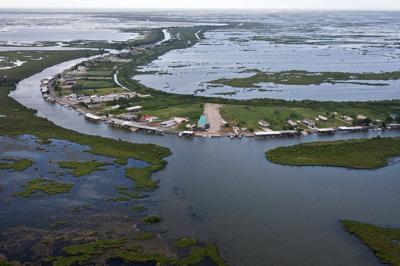Donald Boesch, the native New Orleanian whose long career in science has made him one of the world’s leading authorities on the causes and solutions to his home state’s coastal crisis, has a problem with the way the climate science news is being reported.
No, not the findings. He agrees the world and Louisiana are careening toward unparalleled disasters if human-caused greenhouse gas emissions are not drastically reduced soon.
His complaint is that the second part of that last sentence isn’t getting enough attention.
Science is always about cause and effect. Boesch is concerned the possible catastrophic scale of those effects are making the public overlook the fact they can be reduced or avoided if the cause is addressed.
“When these articles come out it’s important to pay attention to the fact that they consistently show this dramatic sea level rise that could come from polar ice melt in Antarctica and Greenland could be avoided if we actually achieve the goals of the Paris climate agreements,” he said.
“The point is: This doesn’t have to happen if we address the cause that is clearly stated in these papers.”
Of course, Boesch is right; the treatment to the problem is clearly stated. But his complaint is troubling to me because I think the record shows the cause of the problem has been well-reported. It hasn’t resulted in action because of another cause and effect.
The effect: Many politicians still feel free to delay or block the tough regulations and overhauls needed to reduce emissions.
The cause: The public still has not made it a top priority when voting.
A quick Google search of “sea level rise and greenhouse gas emissions” returned 95 million hits in less than one second. Similarly, a search of the “Paris climate agreements” brings 105 million hits in little more than half a second.
Yet a Pew Center poll before the 2020 elections found climate change ranked 11th out of 12 issues considered by likely voters. Only 42% of those polled considered it “very important.”
Meanwhile, one 2019 poll showed more than 70% of Louisiana voters believed in climate change and felt it was already increasing hurricane and other weather events, and a solid majority would pay higher taxes to address coastal issues. And another 2019 poll of Louisiana voters showed “97% want their elected officials to prioritize tackling coastal land loss when in office.”
What these signal to me is that the message about cause and effect is being received by most Louisiana voters — but they keep electing legislators and congressmen who don’t share their concerns.
These elected officials, many supported handsomely by oil and gas contributions, spend most of their time worrying about what effects emissions reforms could have on a shrinking industry that is still laying workers off. They never mention the need: Even delaying taking action could allow the Gulf of Mexico to swallow many of the communities, and jobs, in south Louisiana.
Which brings up another issue Boesch believes the public should be better informed about: Action now may well put off some of those really bad impacts into the next century.
“We need to act now on emissions while sea level rise is not out of control,” he said. “If we don’t act smartly now, a lot of what we achieve with the coastal master plan could be wiped out before the end of this century.
“What people and policymakers need to understand is that what we do in the next 20 to 30 years will determine whether south Louisiana becomes part of the Gulf or not.”
Consider them told.
Bob Marshall, a Pulitzer Prize-winning Louisiana environmental journalist, can be reached at bmarshallenviro@gmail.com, and followed on Twitter @BMarshallEnviro.


